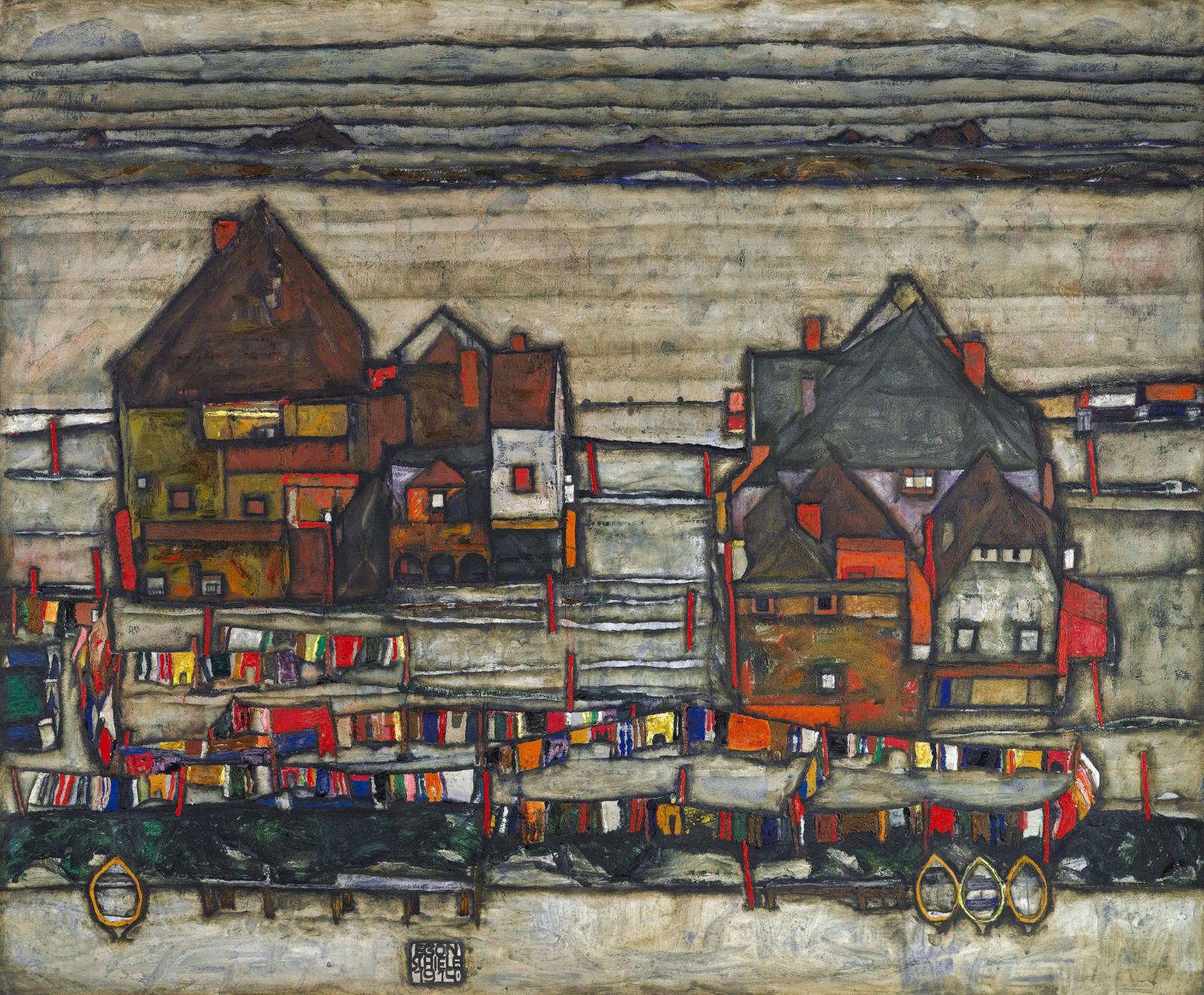Routine
by Carl Nelson (January 2020)

Houses with Laundry, Egon Schiele, 1914
My wife remarked over breakfast the other day how much she enjoyed washing and folding the laundry. She found it relaxing and calming and peaceful on top of being a useful activity. My first reaction was pleasure. ‘Excellent,’ I thought.
My next thoughts, (whispered by my better angels) took a little longer to mature. But they began to flutter around the idea of how much ‘routine’ has been demonized, more and more of late, by whoever are the Brahmins who run this culture. Change is supposed to be an inevitable mandate, and we must learn to continually upgrade our skills and to anticipate and be ready for it, almost as if the future were a war coming. But in truth, the laundry persists. And if there is a war, it is already here—and is piling up, unless someone does something about it!
Say what you want about the future, but it doesn’t pile up. The future morphs into present and then past and then history. The future is rather like a bus route. If the driver doesn’t pick his passengers up, they won’t collect forever. Tomorrow there might be the same number, or even less. Laundry however stays put and piles up. And we need something more credible than personal affirmations and power statements to deal with it. To those experienced, these duties are called chores and are most efficaciously dealt with through routine. Chores are often interpreted to represent the endless grit and slog of existence, the limitless demand on our energies, the dull, repetitive, boring work of getting along in this life.
But they can also be seen as like gravity, as the things which hold us to our lives, preventing us from drifting away off into those airless, cold, inhospitable climes where humans float around all by themselves free of demands. Chores, in this respect, are rather like our flesh and bones and a measure of what it feels to be alive and limited. And so, just like a brisk walk, or a laugh, or styling our hair or shaving, chores can be a much more vivid way of being alive than surviving some reckless endeavor even.
When you undertake some reckless endeavor, what have you experienced? Have you experienced a greater aspect of life, or the nearer aspect of death? Near death might not be just a phrase. Thrill seekers who say that we must live on the edge of life to really appreciate lifearen’t they a bit deluded like the lone cowboy, alienated by the loss of his true love? Can true love exist for only one thing? How can you experience something greater by not being nearer? Does that make any sense at all, when you consider it? (Can you say, narcissism?) Doesn’t any practical estimate of life hang on its presence? How else are we to estimate anything? As the Jewish maxim states, “One example does not a proof make.”
It would seem so simple to suggest that to know something, we must encounter it and the more the better; that we should value our experience. The romantic mindset suggests that to appreciate life, we must nearly lose it to have that one, unique, desperate grasp of it. But my wife’s remark over breakfast, was indeed about appreciating something remarkable. Isn’t it remarkable to appreciate something all the while you have it and all the while you are doing it? What could be more life affirming than the appreciation of a routine, to be with and stare at something for just what it is, and to find yourself enjoying something which needs doing again and again?
Self-Help Poem #48*
Find Your Rut**
My wife, a saleswoman, thinks I live in a rut.
But smart customers buy today
what has served them well previously.
A lot of people, day after day,
are doing the same—but expecting better.
Whereas, I repeat my days to repeat the pleasure.
Once I’ve had a fine week, I go back for another . . .
taking seconds or thirds.
Or if just a portion were pleasing,
then I edit for that.
“If I like my wife, then
I can keep my wife,” I declare,
making the wife laugh.
All suggesting, that her criticism of me
might have been initially too harsh.
________________________
* The Author also offers Self Help Poetry Readings on the following, in groups or one-on-one:
Weight loss
Marital relations
Depression
Work/Life balance
Self – esteem
**For best results, practice in an interlarded application with Self-Help Poem #49, “Do it, Then Stop.”
«Previous Article Table of Contents Next Article»
__________________________________
Carl Nelson has recently finished his book, The Poet’s (40 Pound) Weight Loss Plan, comprised of instructional prose and poetry. Using his method he is walking forty pounds lighter with normal fasting glucose levels and not snoring at night, while currently working on a second volume of Self-Help poetry, The Poet’s (29 Year) Marriage Plan. He lives in Belpre, Ohio where he considers existence while walking his ginger dachshund, Tater Tot. Read about the author and his newest book here.
Follow NER on Twitter @NERIconoclast